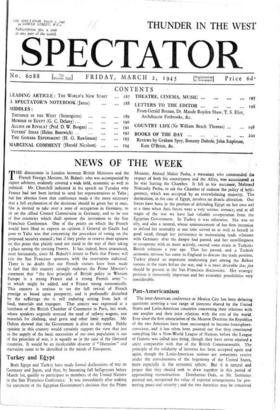NEWS OF THE WEEK
THE discussions in London between British Ministers and the French Foreign Minister, M. Bidault, who was accompanied by expert advisers, evidently covered a wide field, economic as well as political. Mr. Churchill indicated in his speech on Tuesday why France had not been invited to send her representatives to Yalta ; but her absence from that conference made it the more necessary that a full explanation of the decisions should be given her at once. She is invited to take over a zone of occupation in Germany, to sit on the Allied Control Commission in Germany, and to be one of five countries which shall sponsor the invitations to the San Francisco Conference. One of the points on which the French would have liked to express an opinion if General de Gaulle had gone to Yalta was that concerning the procedure of voting on the proposed security council ; but if they prefer to reserve their opinion on this point that plainly need not stand in the way of their taking a place among the inviting Powers. It has, indeed, been announced, most fortunately, since M. Bidault's return to Paris that France will join the San Francisco sponsors, with the reservation indicated. There is no doubt filar our French visitors have been made to feel that this country strongly endorses the Prime Minister's statement that "the first principle of British policy in Western Europe is a strong France and a strong French army "— to which might be added, and a France strong economically. This country is anxious to see the full revival of French prestige as based upon prosperity, and is profoundly disturbed by the sufferings she is still enduring arising from lack of food, materials and transport. That anxiety was expressed at a luncheon of the British Chamber of Commerce in Paris, last week, where speakers urgently stressed the need of railway wagons, raw materials for clothing, seed grain and other basic supplies. Mr. Dalton showed that the Government is alive to the need. Public opinion in this country would certainly support the view that just as the supply of the basic necessities of our own population is one of the priorities of war, it is equally so in the case of the liberated countries. It would be an incalculable disaster if "liberation" and starvation came to be identified in the minds of Europeans.


























